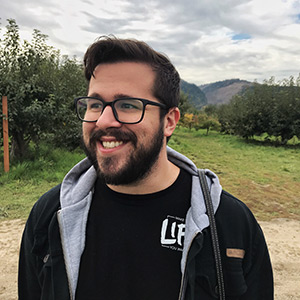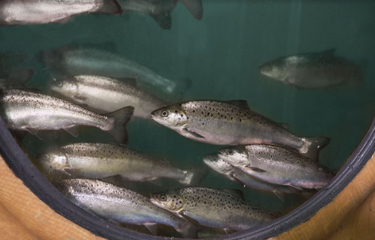As AquaBounty nears the first harvest of its genetically engineered AquAdvantage salmon, the company has started sending samples to its first customers this week for a final quality check before orders are finalized.
Seafood experts working with about 10 retail and foodservice companies looking to be the first to carry AquAdvantage salmon will be checking the samples for overall quality, flavor, color, and texture, and selecting which available fish size will work well for their market, according to AquaBounty CEO and President Sylvia Wulf.
“This is an incredibly exciting time and a historic moment that’s been 26 years in the making,” Wulf said in a virtual press conference on Tuesday, 23 February. “We expect the sampling program to go well – we expect great feedback, as we have done sampling and sensory testing on those fish throughout their lifecycle.”
The company had originally planned for its first harvest to commence in December, but ended up pushing back the harvest period to late March or early April due to the COVID-19 pandemic.
“[That] was not the best time to bring a new salmon supplier into the market,” Wulf said. “No one was looking for more salmon. COVID limited our ability [to launch AquAdvantage salmon] because the market had contracted so much and the pricing had collapsed. But we think that’s going to stabilize … and we’re timing that harvest with the recovery of the economy.”
Wulf declined requests to name any companies that have signed contracts or are considering purchasing AquAdvantage salmon after the launch without direct permission from those companies. She also noted that pushback from environmental organizations was a concern.
“We all know that the activists have made us a target for years,” Wulf said. “We really want to protect our customers as much as possible and work with them to help consumers have the right information to make an informed buying decision.”
U.S. foodservice provider Aramark recently announced it will not purchase AquAdvantage salmon due to an update to its sustainable sourcing policy, joining foodservice companies Compass Group and Sodexo.
Dana Perls, a food and technology campaigner for nonprofit environmental advocacy organization Friends of the Earth, said Aramark’s pledge emerged from private conversations between her group and the company.
“We let them know about the environmental risks, the health risks, and the concerns about the impacts to Indigenous communities,” Perls said. AquAdvantage salmon could potentially “[be] against their sustainable sourcing policies,” Perls said.
AquaBounty has vociferously denied claims from environmental groups that its genetically engineered salmon production facilities might threaten native salmon populations. The company exclusively grows its salmon in land-based recirculating aquaculture systems to prevent escapes and effects on local fish populations, and the GE salmon raised by AquaBounty are sterile, all-female fish, minimizing deleterious effects to the environment in the off-chance of an escape, Wulf said.
Wulf also addressed opposition the company has faced from the commercial fishing industry and from U.S. Senator Lisa Murkowski (R-Alaska), who has led efforts to deter federal regulatory agencies from approving AquAdvantage salmon. Wulf said she believes there’s room for both wild-caught and genetically engineered fish in a world where seafood demand is growing, and that AquaBounty is simply trying to keep up with that rising demand. Wulf said she recalled a conversation with someone in the commercial fishing industry on the roles both salmon products could play in the market where it was suggested that wild-caught salmon could be “the Bordeaux of salmon and [AquaBounty] could be the boxed wine.”
“I’m fine with that,” Wulf said. “We have the ability to produce a lot of salmon and create more consumption for a wider group of consumers.”
AquaBounty said it will complete its first harvest of AquAdvantage salmon in the coming weeks, and that it expects its production to reach 100 metric tons per month at its Albany, Indiana, facility.
The company is also narrowing down potential sites for its third fish farm. The new farm would be the first large-scale commercial facility for the company’s AquAdvantage salmon and is expected to have a 10,000-metric-ton production capacity, compared to Albany’s 1,200 metric ton capacity. In late October, AquaBounty announced it had selected Mayfield, Kentucky, U.S.A., as the location of its new farm, but it later backed off that declaration. The company is completing follow-up evaluations of two other potential facility locations and will have a final decision in late March, Wulf said.
The company is planning to begin construction on the new farm in 2021, with commercial production expected to begin in 2023. According to Wulf, the delay in choosing a site location has not prevented AquaBounty from working on the future facility’s designs or engineering needs, so its timeline for opening and stocking the facility has not shifted.
The company has lots of new money to put to use. On 9 February, it closed its latest public stock offering, netted the company approximately USD 127.1 million ( EUR 110 million) in funding.
Photo courtesy of AquaBounty







